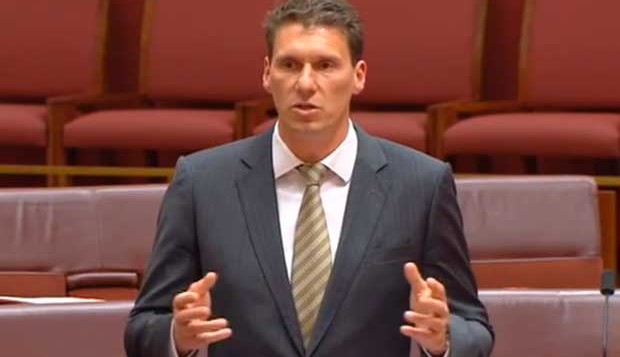Cory Bernardi’s comments last week, suggesting a slippery slope spiraling from gay marriage to bestiality, polygamy and paedophilia, set off a storm of media responses and led to his sacking by Tony Abbott. While it’s clear that many were offended, it’s not so clear that we really know why. In the outrage following his spray, have we gotten any closer to the heart of the matter? Or are we so caught up in pointing the finger that we’ve lost the point?
It’s easy to jump on the condemnation bandwagon when it comes to Cory Bernardi. He has a picture of Margaret Thatcher on the wall! He’s linked gay marriage to sex with animals! His own party and the international conservative movement have rejected him!
Even his wife says he’s self-obsessed!
You’d think from the media coverage of Bernardi over the last couple of weeks that he was an alien recently landed from a galaxy far, far away and not the close relative of Tea Party supporters and right-wing misogynists and homophobes around the globe. By dressing Bernardi up as some kind of crazy conservative clown, we seek to look sane and thoughtful by comparison.
Jean Baudrillard, one of the more irritating postmodern philosophers, once said that Disneyland is presented as fake to make the rest of America appear to be real. We do a kind of terrible over or under-imagining here in our responses to Bernardi’s contribution to the ongoing debate about marriage equality. As Guy Rundle pointed out recently, we are not even bothering to refute the simple ignorance of the slippery slope claims Bernardi is making. Instead, we get offended or we call for discipline. We attempt to distance ourselves from what we argue is a fringe dweller, rather than engaging in responsible debate.
Mohamad Tabbaa wrote recently about the need for Muslims to answer the constant demands to condemn terrorism, with responses that serve to defend the legal and human rights of their community, rather than knee jerk reactions that divide people and polarise our understandings. When the only welcome answer to violence or hatred is outrage at the act and a distancing of ourselves from the actors, we have moved as far away from both freedom of speech and resolution as it is humanly possible to be.
It’s not that violence or the homophobic linkage of gay marriage with bestiality and paedophilia is in any way acceptable or desirable. But if all we can do is scream and point the finger as we back away, then we will never be any closer to an understanding of the roots of these issues. And we will never come close to an open confrontation with ignorance.
This is childish behaviour that many of us never grow out of. Ideally, as adults we’ve learned to master both logic and theory of mind. Theory of mind is simply the understanding that while I have thoughts, beliefs and attitudes to the world, so do you. It’s the crucial understanding that your beliefs, thoughts and intentions may be different from mine. Ideally, I can use this understanding to make sense of why you behave the way you do. It requires both empathy and an understanding of consequences. This is the adult alternative to calling you weird, broken or stupid; the grown up alternative to the naughty corner.
A well-developed theory of mind starts early. We learn about how others think and feel and about the relationship between thoughts, feelings and actions by watching and relating to our caregivers. If those who cared for us were able to talk about their thoughts and feelings, and if they were able to provide reasons for correcting or praising us, then we are more likely to develop a good understanding of the relationship between actions and beliefs. We are then able to make sense of actions we disapprove of because we can understand what the thoughts and feelings are that drive them.
The more time we spend with others who are different and think differently from us, and the more we are dependent on this understanding to make our world work, the better our theory of mind will be. The better our theory of mind is, the better our communication abilities will be. So reactive condemnation is an indicator of an incomplete theory of mind. We’re stuck on believing we’re the only ones with a brain.
So by all means feel free to condemn behaviour you find abhorrent. But don’t let there be debates you are unwilling to have, or actions you are unwilling to try to understand. Because if you close the door on considered responses, especially to the most absurd or dangerous or scary of questions, then you will never come any closer to helping to create a common humanity. Instead, you’ll be helping to build a more vilified fringe. And we all know how hard they can be to grow out.
ABOUT THERAPY FOR NEWS JUNKIES: Why does the news make the news? Why do certain stories gain such traction? Therapy For News Junkies is a regular NM column which looks at why audiences react so vehemently to particular issues. Zoe Krupka is a psychotherapist who uses her knowledge about how we react as individuals to better understand collective responses to the events of the day.
Donate To New Matilda
New Matilda is a small, independent media outlet. We survive through reader contributions, and never losing a lawsuit. If you got something from this article, giving something back helps us to continue speaking truth to power. Every little bit counts.




